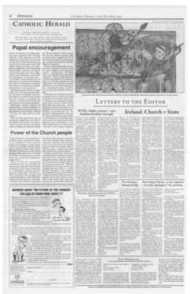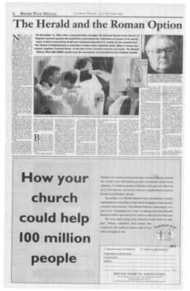Page 5, 31st October 1997
Page 5

Report an error
Noticed an error on this page?If you've noticed an error in this article please click here to report it.
Tags
Share
Related articles
Rebirth Of Christian Workers
How South Africa Locked Up Ycw
Concrete Plan Of Action For Youth
Ycw Rally
Ycw Raise £25,000 To Fight Poverty
Sixty years on, there's still a role for the Young Christian Workers
What about the workers?
Fr MICHAEL MORTON, National Chaplain of the Young Christian Workers, looks back at YCW's history as it celebrates its Diamond Jubilee
cultural WERE several cultural revolutions
in the 1960s. The most famous one in China did not affect us much, but the one that came after Vatican II did. Looking back, one outstanding effect has been the fall in Church membership. In particular, young people are abandoning organised religion and its practice in alarming numbers. This could really be the result of yet another cultural change, less easy to describe, but its result is dismay. People ask: where have all the young people gone?
Sixty years ago, a new movement for young people came to Britain from France. It was called the Young Christian Workers and had been started in Belgium 12 years before by a young priest called Joseph Cardilin. He gathered local groups of working-class young people and helped them to find a new association that gave its members the opportunity to change and enhance their lives together through reflection and action. This work, based on the values from the gospel, helped them to grow in faith. In a short time, the YCW movement had become very popular in Belgium and France and began to spread rapidly. The reason for its success is a story in itself.
Human character and purpose often shows itself more clearly :in local action than in great world crises. During the whole of the 19th century, western Europe lived under the shadow of two radical movements the French Revolution and the Industrial Revolution. They were both described by the same noun, but they were really two different sorts of change. The first was an alteration in the way that people saw their place in society while the second was a change in society itself.
The Catholic Church reacted to these changes in a defensive and hostile fashion. New ideas were condemned wholesale. The long pontificate of Pope Pius IX (1846-78) was an age of wariness and political bitterness between the Church and the Italian state. In fact, throughout Europe the Church of the Victorian age was not terribly successful. Over-clerical and reactionary, it lost much of the influence it had retained since the Reformation and became populist and fundamentalist to compensate.
A reversal came when Leo XIII, the next Pope, published an encyclical called Rerum Novarum in 1891. Pope Leo was a shrewd and practical churchman and his encyclical letter was remarkable because it was the first time that the Catholic Church (or anybody of organised religion) had explored the relationship between capital and labour. So although Leo XIII was no social revolutionary, his teaching made a deep impression in Europe and his letter became known as the "Workers' Charter". When it was translated into English, it took the title The Great Social Problem.
Fr Joseph Cardijn, meanwhile, grew up in Belgium when the country was becoming industrialised. Young people left school early, but they did not go into further education nor go off on backpacking trips. They went into the factories, coal-mines and shops. They also seemed to cut themselves off fron the activity of the Church and social religion. Cardijn experienced this personally as a seminarian. His former schoolfriends distanced themselves from him — he had become part of the bosses' world.
We use the word "alienation" quite freely nowadays, but its original sense was being a foreigner in your own country. Joseph Cardijn saw that the young working-class was set apart from religious faith and its establishment, and in that sense had become alienated. His answer was personal and practical, and parallel to the reflections of Pope Leo XIII.
In time, as a priest himself, he became involved in the world of trade unions and started a junior branch. But he was never a great man for being involved with a branch of anything (like all innovators) and eventually started his own movement which became the Young Christian Workers.
Like all good ideas, Cardijn's was essentially simple. At the heart of the movement was the review of life. It was based on the reading of the gospel in the light of the young people's experienc and daily life. The result was to heighten awareness, make personal change possible and most of all reverse the sense of isolation. It gave the young people something to belong to and in doing so made their Christian faith part of the social transformation rather than making them helpless spectators.
THE YOUNG PEOPI.E may not have described things in that way, but they were alive to the method of YCW. The local group faced a problem in this way: they said, "We see, we are aware of what is happening. We also reflect on these facts in faith and with the value of the Gospel to judge; and we decide what to do, how to act in response".
From the beginning, the YCW had this distinct style of working and a special character of being organised and run by themslves. By contrast, youth ministry is seen as a blanket term by many people, especially those involved in Church life.
They know, or sense, that there is a constituency nearby called "youth" or young people and they classify all action and involvement as basically similar. Cardijn always resisted this, and so did the English YCW when it started. There is always a tension between the generality of youth activity in the Church and the specific nature of the YCW movement.
Many who are involved in the Church action wantto do something for or with young people and are puzzled by the nature of the YCW — they naturally wish the young people to retain the values, actions and circumstances of their own remembered past. But because we are in the middle of a profound cultural dissolution and transformation (much more far-reaching, now, than in the 1960s) and every decade has to have its own idiom and fashion, there is a tendency to centralise and regroup in response.
But the notion of the YCW is not hard to understand; it is something basic and simple. What is less easy to explain comes from the fact that it is not fixed or static. It finds its starting point in different places for each individual and moves at different speeds in varying directions. For the YCW is not only something that happens at a meeting, it is a way of living, even a way of life.
The YCW is not just a youth club that meets weekly and has a good time; it is not some theory or political ideal that you can read about. Neither is it a prayer or bible study group or even a social action group with clear aims. The YCW movement contains all of these things but it is not exactly like any of them. As a movement it begins with a truth that is essential, it becomes a way of life for its members and shows itself in their actions and character and it is found not just in the members but in a community.
S0 THERE IS The history and the reason for the YCW — but where is the real thing? The YCW is ready to celebrate its Diamond Jubilee with a 60th Annivervary Rally, but it is conscious that it has become very small in numbers since its heyday in the late 1950s and early 1960s.
The context for such a youth movement has changed a great deal since Cardijn's insight led to its foundation. In spite of the changes, theYCW has proved very durable and adaptable. In 1992, members from the Italian YCW came to visit in Manchester and started a chain of ideas that led to the formation of "Impact!" This project is for 14to 17-yearolds and grew out of the old pre-YCW. It has its own inquiries, enterprises and is guided by animators, or lay chaplains.
Like the YCW, the Church is faced with many demands which are sometimes contradictory. People want the Church to uphold old science and a traditional vision of the world with the rituals and customs of their own past. But they also need the Church to validate modern society — to share and endorse the values of the modern world. Because these two are in conflict, so is the Church and the YCW too.
It may be that as a Church we will become a modern diaspora, living in society but setting aside meeting-places and using working ministers to help priests keep Christian faiths and traditions alive. The YCW has a cell-like structure and groups not only in this country but all over the world where faith continues to grow and expand. It has a good deal to offer the Church and society. But it has much more to offer young people whose lives have changed for the better with the YCW movement. So in our Jubilee year we ask for the prayers and support of all Christian people and promise that we may be smaller in numbers but still alive and active in the world.
blog comments powered by Disqus











